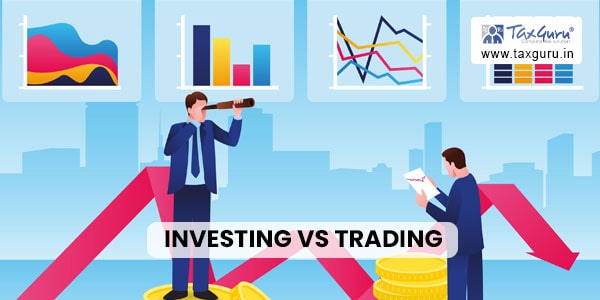“Explore the differences between investing and trading, their psychological aspects, financial goals, time frames, and monitoring requirements. Make informed decisions for growing wealth or earning regularly. Learn about options beyond equity and start your journey, whether with small or large amounts. Read insights and advice from financial experts Renucka Vaiddya and Kedar Nadgonde.”
Many people tend to use the words ‘investor’ and ‘trader’ interchangeably. But such usage is far from the truth as both activities are as different as chalk and cheese. This article discusses several conceptual and practical aspects of trading and investing.
Q- “Can I make more money trading or investing?”
The answer is – it depends on the person’s psychology . There are several factors that determine whether one can succeed as a trader. Some of them are thorough study, practicing your trade plan diligently, learning to manage risk, monitoring your performance, having patience and most importantly being able to overcome actions based only on emotions . For a detailed discussion on these aspects, read our article on ‘Financial Markets and the need for psychology and emotional development’[1]
Whereas for investing one needs to understand the company’s business, the management’s working philosophy, the future prospects of the company, and a thorough study of the balance sheet and other ratios, amongst others.
Both activities require a different mental make-up, which finally decides for a person which activity makes more money.
Q- Do financial goals play a role in my decision of being an investor or trader?
Yes, definitely. If someone wishes to have a passive income or has surplus funds to park, long-term investing is a good option to consider. However, to earn on a regular basis one can look out for trading. To sum it up Trading is perfect way to earn money regularly and Investing is an ideal way to grow wealth over a period of time.
Q- How long do traders or investors usually stay in the investment or trade?
Investors are usually in for the long haul and have a fixed time frame (depending on their plan) for staying invested. Traders usually have a shorter term perspective, which can be identified as a Day Trader or a Positional Trader. The Time frames to wont on can be from a few minutes , hours to a few days .

Q- How frequently do I need to check my trade or investment?
Trades need to be monitored according to your trade’s time frame. For example, if I am taking an intra-day trade, I need to keep a watch on 5 min to upto an hour and actively monitor news simultaneously. Whereas, if my trade is based on positional then, I can monitor once every hour to once every day to keep an eye, if the trade is going according to my study depending on the Time frame I have selected.
Investment is for a longer period usually over one or two years, monitoring news, and accordingly tracking prices can be done. In the case of investment, more time dedication is required before the investment is actually made rather than post-investment. However, timely reviews ensure the investment bears the desired fruits in the long run. Investments need to be monitored, Assessed and Managed from time to time.
Q- Can investing and trading be defined simply?
Investopedia defines investing as “putting money to work for a period of time in some sort of project or undertaking in order to generate positive returns.”
While a stock trader is defined by Investopedia as “a person who attempts to profit from the purchase and sale of securities such as stock shares.”
Q- What if I don’t want to trade in equity, are there other options?
Yes, one can trade in currency and commodity markets where one can trade in natural resources and agricultural products like crude oil, natural gas, gold, etc. In terms of instruments, one can trade in derivatives like futures and options, but these trades are very risky, and proper knowledge and study are required before entering such trades.
For investors, investing in mutual funds, national pension schemes, treasury bills, government bonds, certificates of deposits (CDs), or even foreign exchange-related instruments are a few options available.
Q-Do you have to be wealthy to be an investor or trader?
No, investing and trading can be undertaken with small amounts as well. As one makes a profit, the profits can be reinvested to grow your capital. Of course, having a larger capital opens up more possibilities for investing or taking larger trades.
Having a monthly SIP in a mutual fund is a good way to start for investment. The amount can be eventually increased as per the person’s comfort.
Conclusion
Choosing whether to be an investor or trader depends on your financial goals, state of mind, and dedication to learning the subject of investments. While managing finances is important for everybody, investors and traders dedicate time differently to achieve their respective goals. It is wise to understand your requirements, goals and capabilities and make your decision. Consistent efforts are likely to produce remarkable results.
[1] https://taxguru.in/finance/financial-markets-psychology-emotional-development.html
*****
-Researched & Written by : CS Renucka Vaiddya & Kedar Nadgonde (Financial Analyst & Coach )





